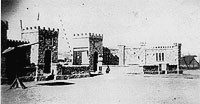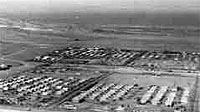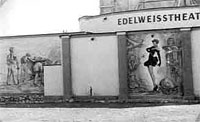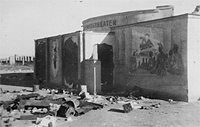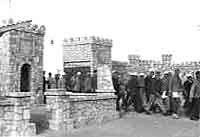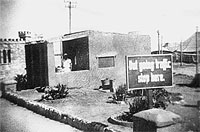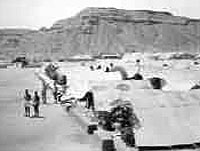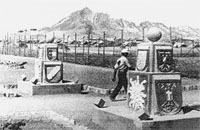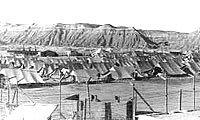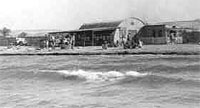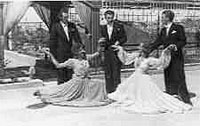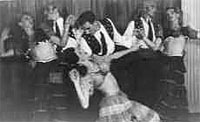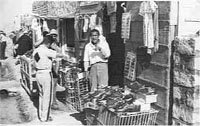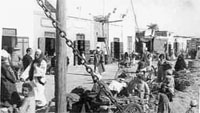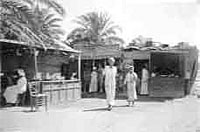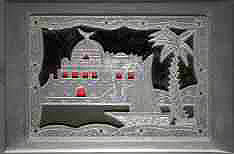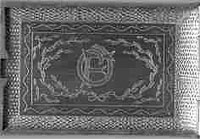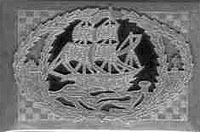Over 50,000 men were housed in these camps being mainly German,
Austrian, Italian and Yugoslavs. They worked for the British Army on the construction
of quarters, in the workshops repairing vehicles, tanks and airplanes, on
road construction, and as drivers, orderlies etc throughout the Canal Zone.
Duties also included the defusing, blowing up and shipment of ammunition.
The average daily wage was 10 piaster.
In 1946 repatriation began with the first 6,000 being shipped
home but unfortunately many stayed in captivity until the end of 1948. In
March 1947 during a speech to the Lower House, the MP for Ipswich, Mr. R.R.
Stokes, stated that the reason for the sluggish pace of repatriation was that
the local British authorities held the manpower of the POW’s to be so
indispensable that they would simply have to wait for repatriation and then
on the 30th September 1947, the British Government announced that it would
be necessary for it to reduce the repatriation to a fraction of the planned
quota because of the shortages of ships. It is no wonder that the morale of
the prisoners were at their lowest and many suicides were recorded.
CAMP 380
Set in the hills with the ‘Big Flea’ to the North West and the
‘Little Flea’ to the South.
The camp was divided into 20 wired cages. Each cage held approx. 400 men
sleeping 10 per tent. Their beds consisted of a palliasse and two blankets
(three in winter). Each cage had its own Officer in Command, Cookhouse and
Medical Tent all staffed by POW’s. For the Officers there were some
huts made from loam. Administration of the camp was left to the prisoners
but inspections took place daily to prevent neglect and illness with uncleanliness
or violations of discipline being punished with detention and loss of work.
In 1946, the British Camp Commandant was Lt. Col. Shirley, Oxford & Bucks
Lt. Inf. with Major Waller-Wilkinson, G.S.C. as 2nd in command
Smuggling was rife amongst the POW’s from their places of work and
the British Police assisted the POW Police on the Main Gate and perimeter
wire. Mainly food and drink was smuggled in – this was due to their
poor diet – working POW’s got 2000 calories per day, non working
1800 calories. Bread was very scarce and fresh vegetables seldom or never
prepared. Vitamin tablets were distributed to supplement their diet and weight
loss amongst the POW’s was clearly visible. Working POW’s were
able to purchase food from the canteens which improved their situation. More
interesting ‘smuggled’ items included local girls disguised as
POW’s - upon checking in the working parties and happen upon a 4ft 6ins
dark skinned POW between two 6ft Panzer Grenadiers suspicions were aroused!
As there was nowhere to run, there were no reported escapees but the POW’s
were subjected to raids on the camp now and again by local terrorists driving
round the perimeter fence in old cars and trucks, firing a few shots and then
making off in a cloud of dust. No one ever got hit, in fact no one really
too much notice.
To improve morale, many sporting activities were introduced –
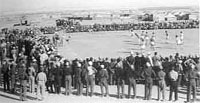
Football
|
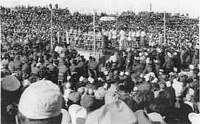
Boxing
|
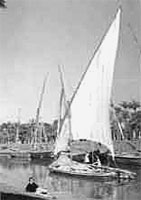
Sailing
|
|
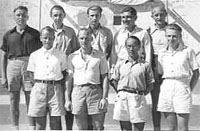
1947 Table Tennis Champions
|
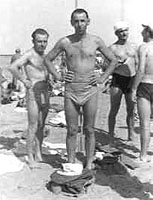
Swimming at Bitter Lake
|
Bathing beach at the Bitter Lake
|
- together with further improvements to recreation with the introduction
of radio, cinema, theatre and musical performances and also the opportunity
of further education.
Shopping in Fayid where they could take advantage of local produce
| |
|
|
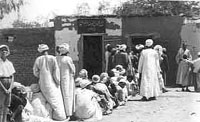
|
|
Repatriation at last. Even now German POW’s faced further regulation
that only 10 lbs of approved luggage would be allowed even though Germany
faced another winter of starvation. Thousand of POW’s had saved their
hard earned, tiny wages for months, even years, allowing themselves nothing
in order to be able to bring a few tins of foodstuffs home to their relatives.
The foodstuffs in question were in the markets in Egypt and could be obtained
in the camp canteens in great quantities, to be used by the POW’s at
will – why should they not be able to save these and take them home?
The POW’s could not understand why they, who had actually already been
discriminated against through their late return home, where further discriminated
against by the aforementioned announcement, while their comrades who were
lucky enough to return home earlier could take such foodstuffs so vitally
necessary for a starving Germany, freely and without limits.
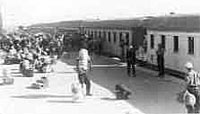
Train for repatriation
|
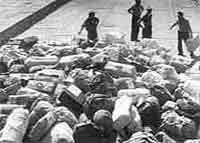
Luggage awaiting boarding
|
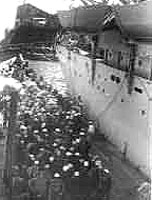
Finally going home
|
Further delays were experienced for those POW’s placed under ‘Automatical
Arrest’ (A.A.) e.g. those who identity was suspected to be that of a
wanted war criminal, or those who are needed as witnesses in such a case.
They were held in custody indefinitely, often unable to discover why and without
sentence. In two cases men were even fetched down from the repatriation ship.
In one case a POW was placed under A.A. without being given notice because
he was mistaken for his brother who had died in the war. His assertions were
not believed and he even pointed out that a comrade of his dead brother could
be found in the same camp and could be interrogated about this. This was refused.
Only after the intervention of MP Stokes who was approached about it, was
the case taken up. The interrogation took place and the POW released. Two
years later, although scheduled for repatriation by British doctors because
of severe asthma, he was still there.
Examples of the cigarette cases crafted by the POW’s and purchased
as souvenirs by our servicemen
Artefacts:
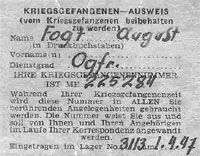
Identity Card
|

"All items in the possession of ….…….. have
been
legally acquired and he has been permitted to retain
them by GHQ, MELF (Signed by Lt. Col. Shirley)"
|
Many thanks to Dennis Aston, John Lewis,
Peter Matthews and Norman Smith
for their help in compiling this feature.
